About the University of Leicester
Robert Harris
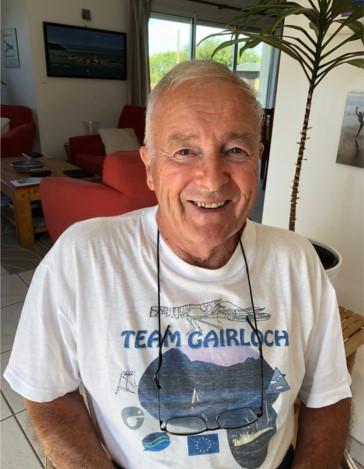 The University has learned with regret of the death of Dr Robert (Bob) Roderick Harris who passed away on 11 January 2023.
The University has learned with regret of the death of Dr Robert (Bob) Roderick Harris who passed away on 11 January 2023.
Dr Muriel Walker, Zoology Department (1972–2003) writes:
Bob Harris read Zoology at the University of Southampton and undertook research towards his PhD at the Southampton Institute of Oceanography. After gaining his doctorate, Bob and his wife Joanna moved to Malta, where Bob lectured at the university for five years. Both Bob and Jo were keen divers and in 1970 Bob co-founded the longstanding (and still active) Calypso Sub Aqua Club – the first purely SCUBA diving Club in Malta.
In 1972 Bob returned to the UK and took up a lectureship in the Zoology Department at the University of Leicester, where he worked until his retirement in 2001. His research was focussed on osmoregulation in Crustacea. Despite Leicester’s location in the Midlands, this was a good place for his work on the shore crab Carcinus maenas with well-established marine aquaria located in the basement of the Adrian Building in the 1970s. He was also interested in invasive species found in local waterways. Emeritus Professor HP Moon had followed the spread from Eastern Europe of Corophium curvispinum into UK waters. Studies of Corophium from Debdale Warf, Leicestershire carried out by Bob with graduate student, Peter Taylor, demonstrated that in terms of its salt and water balance this species was adapting rapidly from its brackish water origins to freshwater conditions in the UK. This work, published in the Journal of Comparative Physiology, B (1986), retains its significance cited in a recent paper on 'Recognising salinity threats in the climate crisis'. Local populations of another invasive species, the North American signal crayfish Pacifastacus leniusculus, were the focus of studies with Jeama Stanton. Carrying crayfish plague, the invaders are a threat to the native white clawed crayfish Austropotamobius pallipes and also cause damage to waterways with their burrowing behaviour.
Over his long career at Leicester, Bob undertook many overseas research studies and collaborations with colleagues across the world, including Barbados, Malta, France, Brazil, Portugal and the Pacific Islands, the latter involving a study of salt and water balance in the terrestrial crabs, Gecarcoidea lalandii, Cardisoma carnifex, Birgus latro. Later in his career, Bob also undertook a cross-border EU-funded research project in Gairloch, Scotland in collaboration with research colleagues from Denmark, Norway and other EU countries, and a trawler crew from Buckie. The project sought to find ways to make trawler fishing more sustainable, and in particular reduce the negative impact of trawler fishing on the species Nephrops norvegicus.
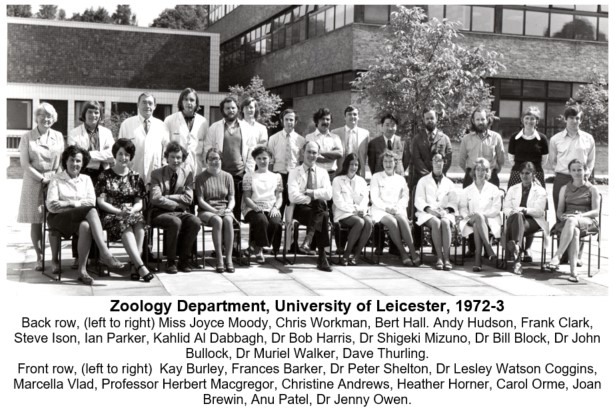
Bob taught in a range of different courses as the teaching programme for Biological Sciences students evolved over the years. He also introduced his many final year project students to the intricacies of laboratory work. Professor Alison Taylor (Department of Biology and Marine Biology, University of North Carolina Wilmington) comments on her lasting memory of Bob’s "patience and trust in an undergraduate handling radioactive isotopes to explore Na+/Cl- exchange in crayfish. It is no accident that a strong theme of my research career has been membrane transport and physiology. Now I reflect upon it, my path may have been very different, and certainly far less interesting, had I not had such wonderful tutors and lecturers such as Bob and his colleagues’."
As well as his responsibilities for single subject students, Bob served as Associate Dean for the BSc degree in Combined Studies. These students read Biological Sciences courses combined with another subject including Psychology, Geography or Geology, and Bob was a fierce advocate on their behalf. The Environmental Physiology Field course usually held at Dale Fort in Pembrokeshire is well remembered by those regularly involved, namely Bob, his technician Maurice Andrews and myself. Happy memories of many hours yomping up and down Sandy Haven estuary ‘fossicking’ in the rock pools at St Brides, or West Dale Beach. Observing species not seen on earlier field courses was always a bonus. It has to be said that not all undergraduates appreciated traversing the sediment at the top of the estuary in particular in the rain or sometimes snow at Easter. It was always a pleasure to see how students responded to the enthusiasm of Bob’s dedicated teaching about the interrelationship between the physiology of an organism and its position on the shore, along with expert guidance in all aspects of their field work and subsequent experimental work in the lab. Other incidental memories of Dale include the year when late 1970s TV drama The Onedin Line was being filmed off Dale point, and the year when students working in Castle Beach Bay were joined by the SAS on exercise rehearsing a beach landing. For one year in the early 1990s, Dale Fort was exchanged with the Station Biologique, Roscoff in Brittany, and on this occasion, Jo joined the team to act as a French interpreter. A different experience but a lasting memory for all staff was fact that Leicester undergraduates preferred hamburgers from MacDonalds to the ‘Fruits de Mer' offered by the Station!
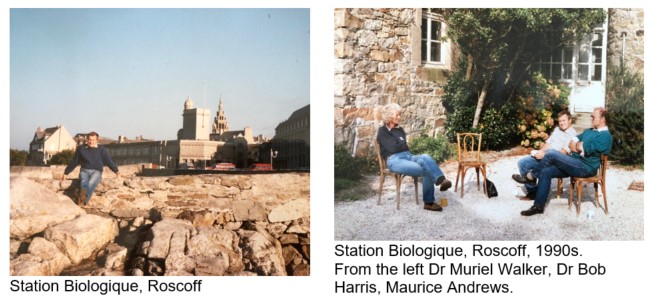
I first met Bob in the Fielding Johnson Building, when we were waiting to be interviewed along with other candidates for appointment to two lectureships that were available in the Zoology Department. A self-contained person, Bob carried out his work without fuss or fanfare. He set high standards for himself and expected the same from others. Always helpful and supportive, it was a pleasure to work with Bob, who was an exemplary colleague for thirty years and has been a great friend for half a century. He will be remembered by all who knew him with both great respect and affection.
In the words of other colleagues:
“I want to start by saying what Bob brought to the lives of me and others round me at Leicester. For me personally, Bob was immensely and unfailingly kind and helpful to me when I joined the department. He was cheerful and reliably good company, courteous and considerate and always ready to help or give a bit of advice or support if he could see I needed it. I was hugely grateful to him for that. Bob always made time to be kind and that marked him out as a specially good person in my book. On the wider front, what he gave to the department in terms of dedication to his duties, care for the Combined Studies students who passed through during his years in charge of that academic stream, care for his own personal tutees and generosity with his time to his colleagues and the department as a whole were all remarkable. He was a much-loved fellow traveller and I am sure that you will be hearing many comments in this vein from our ex-colleagues as they learn of his passing. He made a big difference to many people's lives: a marvellous legacy.”
Dr Alma Swan, former Lecturer in Zoology at the University of Leicester
“I remember Bob from my time as a student at Leicester. Bob was a great lecturer – an unflappable, ‘no-nonsense’ academic who really knew his stuff and he was very encouraging of students that were keen to learn. I remember fondly the field trip he led with Muriel to Dale Fort, and especially the estuary sampling exercise“
Professor Iain Barber, University of Aberystwyth
“Bob Harris was my supervisor during my PhD, from 1992 to 1995, in a joint programme between the University of São Paulo (USP) and the University of Leicester (UoL), sponsored by the Brazilian Government (CAPES). During this period, I spent a whole year (1992) at the Leicester Zoology Department. Bob made my experience there special by the way he always did things, starting from welcoming me personally at Heathrow and then showing me around. During the week he showed his professionalism through his support as a researcher and supervisor. Some weekends he would show his hospitality by taking me to meet his family and explore the countryside, or for a pint in pub or dinner at his home. In both scenarios he was always kind and attentive. After this period in the UK, Bob came to Brazil with his beloved wife Jo, to help me with some final experiments at the Marine Biology Center of USP. It was a wonderful period for me, during which I was honoured to learn a great deal about crustacean osmoregulation under his guidance. But our story did not end there. We kept in touch over the years and we met at different places, the last time was in Paris in 2019. Bob was a strong inspiration for me in science and will always be remembered not only by his excellence in research but also because of the very generous human being he was.”
Claudia Bueno dos Reis Martinez, former PhD student of Bob Harris, and Professor at State University of Londrina, Paraná, Brazil
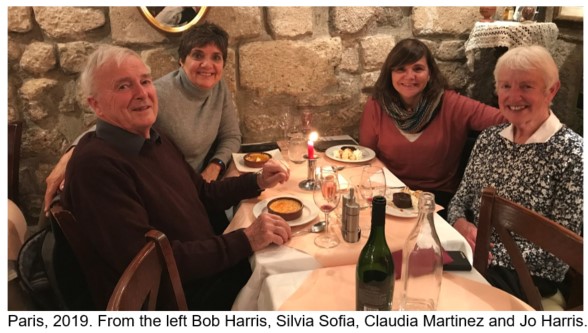
The family writes:
Bob was a devoted, loving husband and companion, who supported his wife Joanna unfailingly for their 60 years together, from their very first meeting as freshers at the University of Southampton, throughout their 58-year marriage and happy family life. He was a wonderful Dad, who with Jo gave his daughters Catherine and Nicole a childhood full of fun, laughter and love; supported them throughout their school years and beyond, and took great pride and interest in everything they did. He was an equally lovely Grandad who took great joy and interest in his three granddaughters.
Bob was determined to be a scientist from a very early age. Following his early life in Zimbabwe (then Rhodesia) and Wales, then a grammar school education in West Sussex, he became a scholarship student in Zoology at the University of Southampton, before embarking on a long and distinguished research and teaching career. He was utterly committed to, and passionate about his research and teaching work, and the family has many memories of his working life, including his fascinating lab full of (to us!) strange-looking sea creatures in the depths of the Adrian Building and his little office near the old Department of Zoology museum, which smelt strongly of chalk dust, was piled high with papers, interesting artefacts, and postcards from faraway places, and was more often than not (to quote a former colleague) well-attended by students looking for advice, guidance and support. The family also remembers him telling stories about funny practicals and lectures and tales of adventurous times overseas during his research sabbaticals; and closer to home, recalls him patiently marking work or reading through hundreds of UCCA (as it was then) forms of an evening.
Bob/Dad’s knowledge about sea life was encyclopaedic, and he had a lifelong love of the ocean, spending much of his life either on it or in it, whether in a wetsuit or on a bodyboard! A walk along the shore with him was an education in itself. To quote friends and family: “We remember the beautiful walks we took together on the beaches in Crozon or near Port Blanc to find crabs, shells and other animals and plants. Together with him we always learned something new.” and “I will miss him, always a cheery voice and such a lovely man, I still remember him pulling me out of canals and ponds, and pointing out all the various aspects of life in rock pools in Scotland.”
For his family and friends, Bob was quite simply a joy to be around. He had a great sense of humour, and the most infectious and irresistible laugh when something really tickled him. He was knowledgeable, always widely read and well informed, with a longstanding interest in the environment, nature, and current affairs; he kept close tabs on the Guardian website for as long as he could, and regularly sent on petitions to sign about the issues that were close to his heart. He was passionate about equality of opportunity and human rights, and the transformative power of education, and embodied his belief in the latter through his lifelong career as an educator. Bob was also a great conversationalist and correspondent, who loyally kept in touch with many former colleagues and friends from around the world over the years. They, and the family, will miss his well-informed, thoughtful and funny replies, advice, stories, and messages more than words can express.
When Bob retired, he and Jo moved to the Crozon peninsula, in Finistere (Brittany). He loved it there, spending 18 happy years enjoying the wild landscapes and the Atlantic Ocean in all its moods, working hard on the beautiful garden they created overlooking the sea, and adding new friends to the many he made across the globe over a well-travelled life.
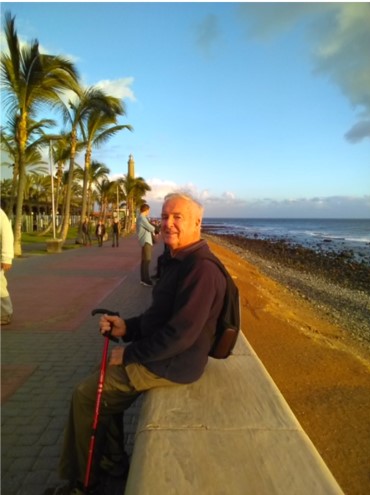 The family will remember Bob most in the great outdoors, especially in his favourite wild places such as Finistere and the Scottish Highlands, enjoying nature through his love of walking, or swimming and bodyboarding in the sea he loved so much.
The family will remember Bob most in the great outdoors, especially in his favourite wild places such as Finistere and the Scottish Highlands, enjoying nature through his love of walking, or swimming and bodyboarding in the sea he loved so much.
In all aspects of his life, in his quiet, thoughtful and unassuming way, Bob had an enormous positive impact. We were lucky to have him in our lives, and will forever be grateful for his lifelong love and support. He leaves a gap in our lives that will never be filled, and we, together with his wider family and friends, will love him, think of him and miss him always.
The family plans to hold a memorial for Bob in the UK over the months ahead.